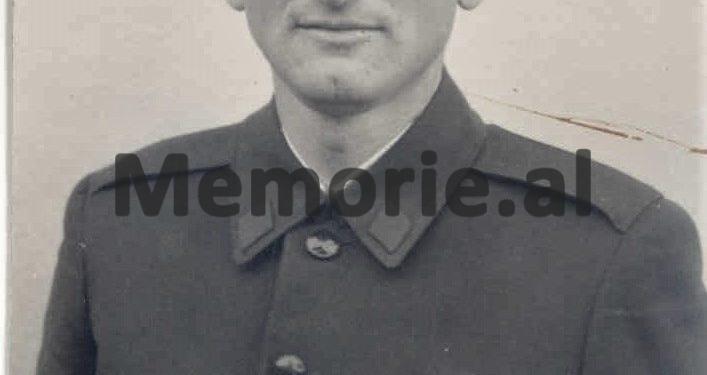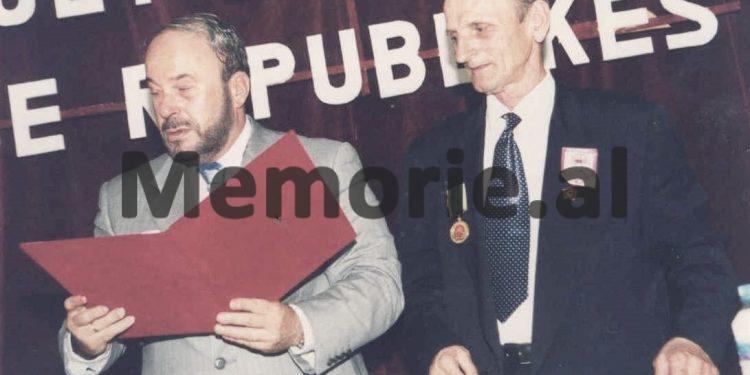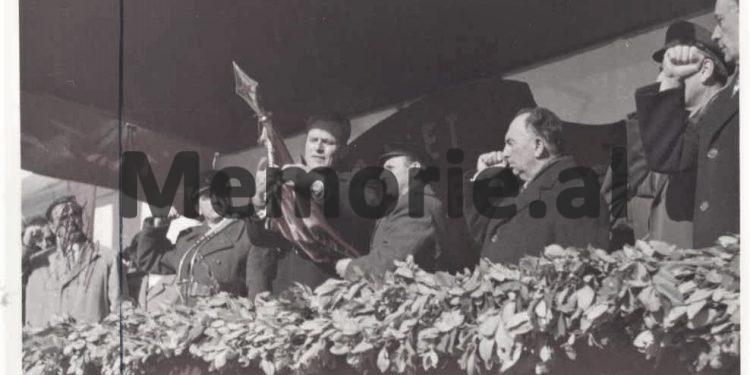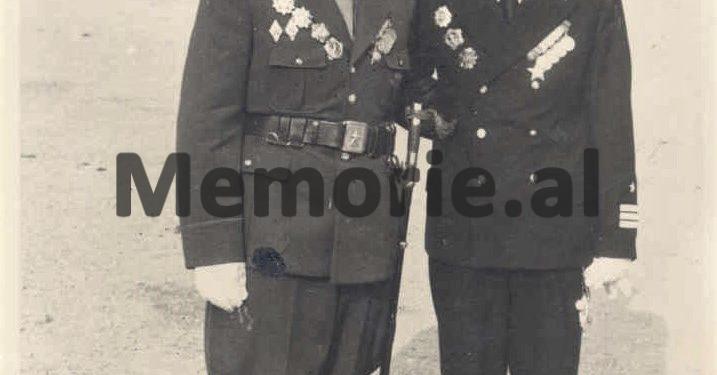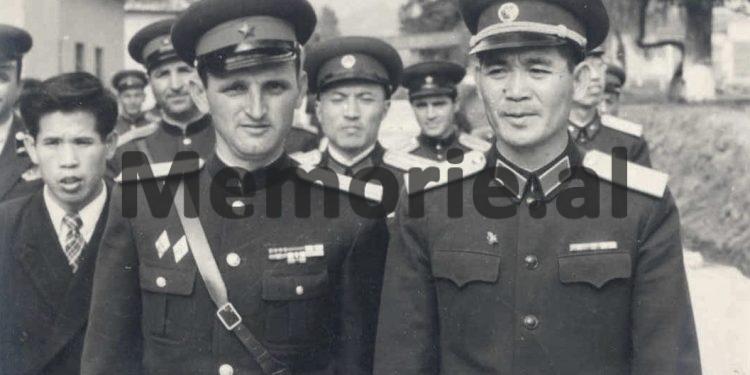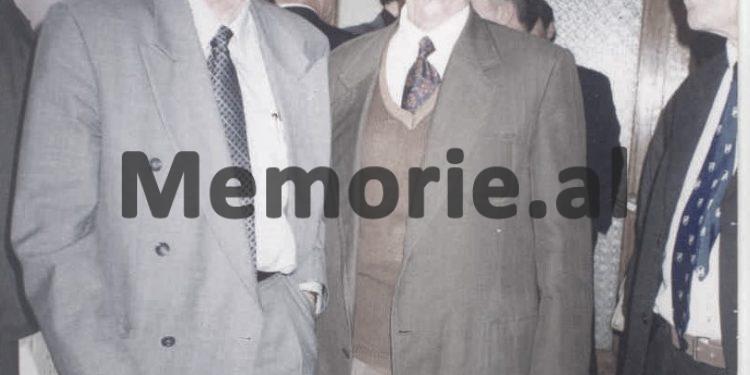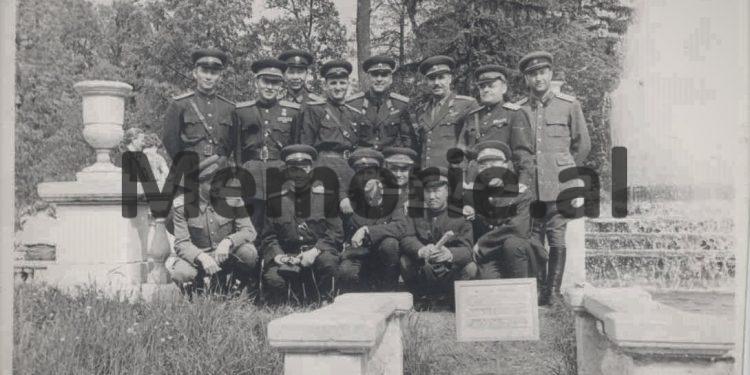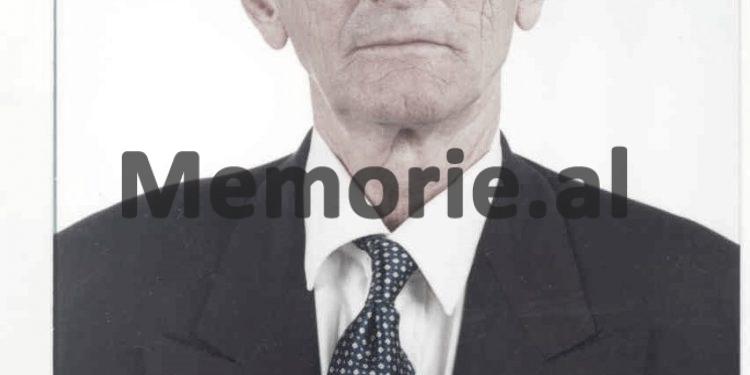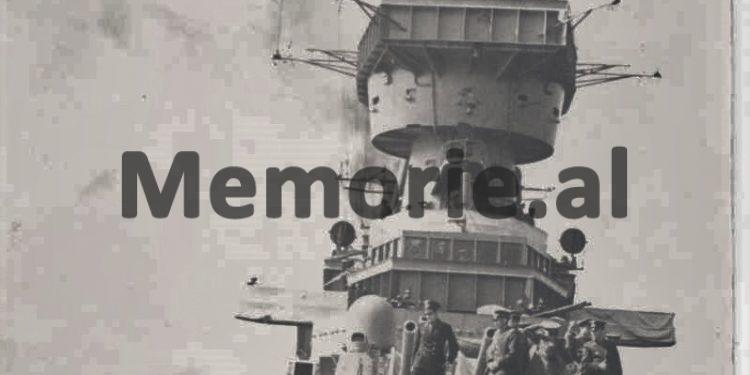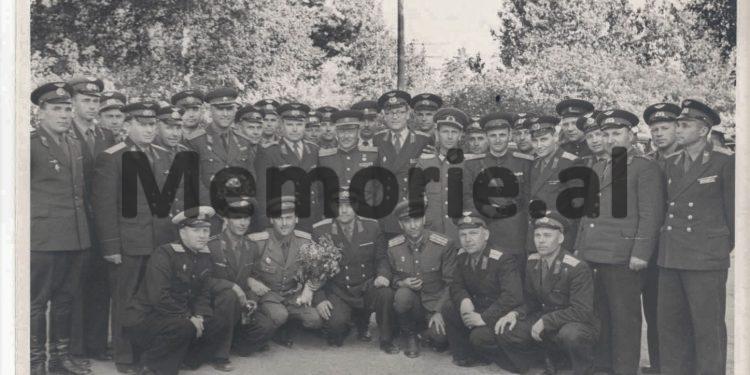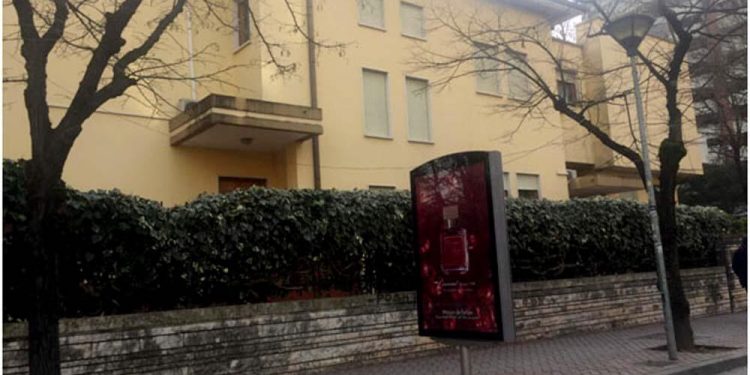Dashnor Kaloçi
Memorie.al publishes the unknown story of Colonel Xhaferr Peçi, originally from the village of Kuç in Kurvelesh, Vlora, a suckling of one of the most famous families in that area, which during the period of occupation of the country (1939-1944), was engaged in all with the Anti-Fascist War, where Xhaferri with his father and four brothers, took an active part with weapons in hand in the partisan formations of the Vlora district and in Mehmet Shehu’s Assault Brigade, where he was appointed deputy commander of the Battalion of first commanded by Tahir Kadare. Xhaferri was sent to the Soviet Union shortly after the end of the war where he initially completed a lower officer training school and then graduated from the Frunze and Voroshilov Military Academies, after which he returned to his homeland until 1972. served as brigade commander in the districts of Korça, Shkodra and in Tirana at the Ministry of National Defense, in the Operational Directorate of the Army. Xhaferri was appointed Commander of the Republic in 1972, where he served with devotion and loyalty to Enver Hoxha and the entire senior leadership until June 1982, when, on the orders of Ramiz Alia, he was called by the Director of The staff of the Central Committee of the ALP, Mihal Bisha, who communicated his resignation from that position, as the senior leadership suspected him, as a person close to the former Prime Minister Mehmet Shehu!
“The night of December 17 was for us a normal night of service like all other nights. The next day, on the morning of the 18th, at around 8.30, one of my officers informed me that I had to leave urgently after Xhule Çiraku, the Deputy Minister of Interior, was looking for me. I left immediately with my car and when I went in front of Mehmet Shehu’s villa, I found there the Minister of People’s Defense, Kadri Hazbiu, Llambi Ziçishti (Minister of Health) and Xhule Çiraku. As soon as I met Kadri with Xhulen, they told me: ‘Mehmet Shehu has killed himself, but do not report until we clarify’. This is how the former Commander of the Republic Guard, Xhafer Peçi (three times graduated from the Academies of the Soviet Union), recalled, among other things, the much-discussed event of December 18, 1981, when Prime Minister Mehmet Shehu was found dead in his room. of his villa.
Mr. Xhaferr, who appointed you commander of the Republic Guard and why were you selected for that rather delicate task?
In September 1972, Hysni Kapo (member of the Politburo and Secretary of the Central Committee of the ALP) called me to his office and told me that he wanted to appoint me as Commander of the Republic Guard, instead of Zija Kambo , former acquaintance general. After that, as was the custom for us communists, I told him that: I was ready to work where the interest of the Party and the homeland demanded. A few days later, the Minister of Internal Affairs, Kadri Hazbiu, the Chairman of the Presidium of the People’s Assembly, Haxhi Lleshi and the member of the Politburo, Rita Marko, came and introduced me to the Republic Guard.
Did Enver Hoxha know about your appointment to that position, or more precisely did he get his opinion on your candidacy as commander of the Republic Guard?
I say that it was done with the knowledge and approval of Enver Hoxha, who knew me personally since the time of the Anti-Fascist National Liberation War, when we were together in Vidhkuq of Korça. Likewise with the Prime Minister Mehmet Shehu, I had personal acquaintances since I was in the First Assault Brigade since the day of the inauguration in Vithkuq of Korça in August 1944.
Why were you chosen for that task?
My choice in that post was made for several reasons: where the most important was my military training, having graduated three times in the military schools and academies of the former Soviet Union, and I also had a military career commanding several Brigades. Also, the patriotic origin of my family was seen, which was all related to the War and my brother, Balili, was a ‘Martyr of the Fatherland’. All of these were guarantees that function required at the time.
How did the Republic Guard function at the time you took over as commander?
At the time I took office, the Republican Guard operated under the Soviet system. After the events in Czechoslovakia in 1968, it was completely reorganized with a new system. At that time, the Garda was equipped with new and modern equipment of the time, which came to us from the People’s Republic of China, such as: tanks and anti-aircraft artillery, etc.
What services did the Guard cover and how did they work?
The main task of the Garda was to maintain and accompany the senior leadership in the “Block” of leadership and in their holiday villas, such as in Dajt, Durrës, Pogradec, Vlora, Leshë, etc. To secure the “Bllok” in Tirana, this protection system was used: The first siege was with private houses and palaces inhabited mainly by highly trusted people who held important party and state functions and the rest who lived there, were from Second Directorate of the Ministry of Internal Affairs (Providing leadership). They performed the service in civilian uniform. These were also companions of high personalities, when they moved outside Tirana. The second siege consisted of soldiers and officers who were armed. Behind these was a third siege, consisting of trained officers, who performed the service in civilian uniform. They observed all the movements of people entering and leaving the outskirts of the “Block”. Some of them occupied positions at the dominant heights, such as on the terraces and roofs of high palaces overlooking the “Block”. All three of these service structures coordinated and interacted with each other, both night and day. While to provide “One” and “Two” (Enver and Mehmet), next to them were the service groups, who maintained close links with the services of the Guard with liaison (radio-telephone-visual).
Who commanded the services of “One” and “Two”?
The services of “One” and “Two” were commanded by Sulo Gradeci and Ali Cheno. Likewise, to ensure the lives of the “One” and the “Two” inside their homes and offices, there was a secret door that connected to the shelters, in case of any surprise blows that might come. These shelters were guarded at their exits, which were usually in the gardens and courtyards of villas, with armed soldiers. Only I, as the commander of the Republican Guard, had the right to control those places.
But apart from those shelters, did Enver and Mehmeti have others outside the “Block”?
In any case of aggression, that the senior leadership of the ALP could not stay in “Bllok”, it had other shelters outside Tirana, which were very modern, where it could stay very long with all the necessary conditions.
How did you act as the commander of the Republic Guard, when Enver or Mehmeti were moving outside Tirana?
When Enver or Mehmeti had to move out of Tirana, a headquarters was set up, headed by a Deputy Minister of Internal Affairs. I was a member of this Staff and I always accompanied them, in all the moves they made. I was first informed about the movement of “One” and “Two” by the Minister of Internal Affairs, Kadri Hazbiu, who gave me the whole plan of their movement. After that, the first thing to do was to fully secure the roads, bridges and squares where they would cross. After that, I called all the District Heads of Internal Affairs Branches from where the two main leaders would move and asked them what were the most delicate points to be guarded, being covered with service. There were many cases when many of the people who were suspicious and with biographical problems, in order not to let them go to the rallies of Enver and Mehmet, isolated them, assigning them different jobs where they worked and kept them under full control. (It is often said that many of them were escorted and detained in the isolation rooms of the Internal Affairs Branches, for as many days as the activity took place, and then released, but I am not sure about that, because they were dealing with those jobs. friends of the districts).
What about when they went on vacation outside Tirana, to the villas they had in some districts of the country?
They were also guarded when they went on vacation outside Tirana. Usually Enver spent his holidays in Vlora, Pogradec, Dajt and Durrës.
According to what you had ascertained at the time you were in charge of the Guard, who was Enver’s closest man to the “comrades” of the leadership?
Hysni Kapo was Enver’s closest man and Mehmeti came after him.
What about the holidays, did Enver spend with Hysni and Mehmet?
Enver, on rare occasions took vacations with these two, as he mainly rested with Ramiz Alia. Perhaps this is also due to the work and function held by Ramiz, as the secretary of the Central Committee of the ALP, as Enver instructed Ramiz on many things related to his task. I remember once when Enver was vacationing in Vlora, he called Ramiz from Tirana to guide him to an article about the “Third World” that was published the next day in the newspaper.
Do you remember when you accompanied Enver Hoxha for the first time outside Tirana?
I accompanied Enver for the first time in the spring of 1972, on his long trip to the North of Albania. After that I accompanied him in all movements outside Tirana.
What about meeting him for your work problem, have you had cases?
There were times when Enver called me and we talked together, of course about the problems of my work as a Guard commander. This is how I remember once when we were at the villas on Dajti Mountain, he called me and asked me how we had spent the feast of the First Assault Brigade that took place in Vidhkuq of Korça. I told him that Mehmet Shehu came there and we had a great time.
“During the ten years that I was Commander of the Guard, there was no attempt to kill Enver Hoxha.”
How do you remember the night of December 18, 1981, when Mehmet Shehu was found murdered?
I remember that event very well, because from it came my departure from the Republic Guard. On the night of December 17, 1981, services in the leadership “Block” continued normally. I received the news of the murder the next morning on December 18 at around 8.30 am, when my officers informed me, telling me to go there quickly because Xhule Çiraku, the Deputy Minister of Interior, was looking for me. As soon as the news of Mehmet’s murder was heard, the first to go there were: Kadri Hazbiu and Ramiz Alia.
How did you receive that news, based on the fact that with Prime Minister Mehmet Shheu, you had acquaintances from the war period when you were in the First Assault Brigade, which was commanded by him?
As soon as I was informed about what had happened, I was very shocked, because I had a very good relationship with Mehmet. Urgently, I drove in front of his villa, where I met Kadri Hazbi, Xhule Çiraku and Llambi Ziçishti, the Minister of Health. Kadriu and Xhulen told me not to inform anyone about the event until it was clarified. Immediately after that I gave the order to strengthen the services and switch to high alert.
Did anyone ask about what had happened?
While I was waiting in the courtyard of the villa, I asked Ali Chenon, the bodyguard and commander of Mehmet’s escort group, who told me: ‘We have not heard anything, but we are waiting for what they will tell us, that how the work happened ‘. At 9.30 Ramizi and Kadriu went to the meeting of the Politburo, which had started the day before and was left to continue that day. Before leaving, Kadriu told us to strengthen the services, and to continue the forensic expertise. He was already very shocked. In those moments, we saw Enver coming out of his villa and going to the Politburo meeting with his head down.
During the time you were there, who entered Mehmet’s villa?
Inside the villa where Mehmeti was dead, Llambi Ziçishti and his people entered and told us that the suicide had taken place around 03.00 at night.
Did you receive any instructions from the top leadership or the Ministry of the Interior regarding the service that the Republican Guard should do after what happened?
The Deputy Minister of Interior, Raqi Iftica, came and by order of the Minister Hekuran Isai, told me to gather the officers and soldiers of the Guard and to inform them that: Mehmet Shehu had committed suicide.
What about the funeral ceremony, was the Republic Guard engaged?
Yes, we definitely did. The next day his funeral took place under the care of Kiço Kasapi, the Secretary General of the Prime Minister, where I gave him ten soldiers to help him with the funeral problems.
It is said that Kadri Hazbiu went to Mehmeti on the night of December 18?
I do not know and cannot say anything about it. I know that on the night of December 17, Kadri Hazbiu, together with some other friends, officers of the Ministry of People’s Defense, was at a dinner in Lapraka, with his former secretary Hiqmeti. There for that reason, they stayed until 01.00pm and then left for their homes. “I do not know and cannot say where Kadri Hazbiu went after that dinner.”
After that event until when did you stay as Commander of the Guard?
I continued my duty as Commander of the Republic Guard until June 1982, when Mihal Bisha called me, (Director of the Personnel Directorate of the Central Committee of the ALP, who told me that: by order of Ramiz Alia, I to move from that task because I was old enough.
How did you react after that?
I addressed Mihali, saying: And Ramiz Alia has reached the age, that he is the same age as me, but why does he not retire?!
How did he respond?
Mihali told me that they had thought of me, to go to the advisor of Hekuran Isa and asked for my opinion. He also asked me who I thought would go to my country, as there were two candidates, Dane Binja and Enver Pata. I recommended Dan, who was appointed Commander of the Guard in my country.
Why did you refuse the task as advisor to the minister, Hekuran Isai?
I rejected the proposal to go as an advisor to Minister Hekuran Isai, as I knew very well that I was being removed as a close associate of Mehmet Shehu, since the time of the War. For this, Ramiz Alia with Hekuran Isain, suspected me and after me they removed all the other cadres that they thought had had close or distant connections, with Mehmet Shehu.
After you left that task, did you have any problems and how were you treated?
“After my release, for a long time I was regularly monitored by the State Security, because the senior leadership of the ALP was afraid of us, the senior military who had had relations with Mehmet, what would we do… !?”
Who was Xhaferr Peçi, the connoisseur who graduated from three academies in the former Soviet Union?
Xhaferr Peçi was born in 1926 and he comes from a very famous family from the village of Kuç in the province of Kurvelesh in Vlora. His grandfather, Balil Peçi, took part in the wars against the Turks in 1847, together with the famous Zenel Gjoleka. Xhaferi’s father, Metua, was also the commander of the Kuçi gang and fought against the Greek andarts in 1912-13, in defense of the coastal villages. From this, in 1913, the Greek andartes burned Kuçi and the house of Metos, who left with his family for the area of Mesaplik. Also in 1920, Meto Peçi fought against the Italian forces at the head of Kuçi’s gang (appointed by the Vlora Liberation Committee) and after that war, he paraded in “Flag Square” at the head of the gang. When Fan Noli came to power in 1924, he appointed Meton commander of the area, based in Brataj. On April 7, 1939, Metua sent his two sons, Hasan and Tekiu, to fight in Vlora. Meto’s family then all connected with the Anti-Fascist Movement and his five sons: Tekiu, Balili, Aliu, Xhaferi and Iljazi, together with their two nephews, Zigurin and Lulon, joined the partisan brigades of Enver Hoxha and Balili. (Battalion commander in the 6th Brigade) with three grandchildren of this family (Istref Gjoliku, Mit`hat Goxhaj and Ali Çela) were killed in the war in an attempt to invade the forces and after 1944, were declared “Martyrs of the Fatherland” . Xhaferi himself, after meeting with Hysni Kapo and Vehbi Hoxha in 1942, was assigned to the youth affairs and in June of that year he joined the Kuçi gang, commanded by Bexhet Mema and Mustafa Matohiti. During that period, Xhaferri took part in several actions carried out by that gang in the village of Gusmar and the Gjorm War, where he fought together with his brothers and his father. With the creation of the First Assault Brigade commanded by Mehmet Shehu, Xhaferi was assigned there, taking part in all battles and at the end of the War, he became the deputy commander of the first battalion, commanded by Tahir Kadare. After the end of the war, Xhaferi was appointed deputy commander of the Military Brigade in the city of Vlora and in 1947, he was sent to study in the Soviet Union, where he graduated from a military school that recruited new officers. After returning to Albania, he was sent to study and twice more in the Soviet Union, graduating with honors, in two military academies: “Frunze” (1951-’54) and “Voroshillov” (1958-’60 ). From 1960 until 1972, Xhafer Peçi was appointed and served as the Commander of the Brigades in Korça, Shkodra and Tirana, as well as in the Ministry of National Defense, in the Operational Directorate. In 1972, he was appointed Commander of the Republic Guard, securing and guarding for ten years, Enver Hoxha and all the senior leadership of that time. Memorie.al





